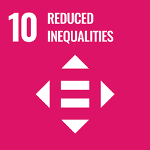About Reduced Inequalities
Reduce inequality within and among countries.

We work towards the UN's Sustainable Development Goal 10 - Reduced Inequalities, to create a better and fairer world.
The 2030 Agenda for Sustainable Development was adopted in 2015 by all United Nations member states. It provides a blueprint for peace and prosperity for people and the planet.
Find out more about our work across all the UN's Sustainable Development Goals.
Reduce inequality within and among countries.

‘Permanently Progressing? Building secure futures for children in Scotland’ is a collaborative research project led by academics at the University of Stirling. The project gathered information on all 1,836 children who became looked after in Scotland when they were aged five or under in 2012/13.
Phase 1, running from 2014 until 2018, explored children's pre-case experiences, pathways and early outcomes. Phase 2, running from 2020 until 2024, built on the findings of Phase 1 by revisiting the same cohort of children to find out where they are living, their legal status, and what sources of support are available to them. Phase 2 is being jointly funded by a philanthropic donor and the Nuffield Foundation.
Researchers at the University of Stirling exploring the long-term outcomes for trafficked children in Scotland have found that children face system trauma connected to navigating the asylum, welfare and child protection systems.
The research has been undertaken by the University of Stirling, was supported by Terre Des Hommes and Just Right Scotland, and funded by the Modern Slavery and Human Rights Policy and Evidence Centre (Modern Slavery PEC), which in turn is funded by the Arts and Humanities Research Council (AHRC). Research concluded that Home Office delays in granting asylum applications and the uncertainty of removal from the UK created long-term system trauma to the children and young people who were trafficked.
The University’s MSc Substance Use course is designed for current practitioners looking to develop and further their career in the field of substance use, as well as for individuals looking to build on their undergraduate studies.
The syllabus explores how current practice and policy affects people who use drugs and/or alcohol, affected family members, practitioners, communities, and wider society. Students have the opportunity to expand their knowledge on alcohol and drug theory, related policies, and interventions at local, national (Scotland and UK), and international levels whilst also learning about social research methods and how these are used to inform research in the field.
The University offers a dedicated mental health support service to help students throughout their time at Stirling if the pressures of studying are causing anxiety. A Mental Health Adviser will provide a comfortable and confidential space in which to explore a student’s mental health and support options.
The aim is to enhance the student experience whilst supporting them to reach their potential. Advisors will support students in managing the impact of mental health on their academic journey and offer advice on reasonable adjustments to consider the most appropriate ongoing support. Our advisors deliver comprehensive, specialist support to students with a wide range of mental health conditions.
The University’s Corporate Parenting Plan is based on the core principle that Stirling is a place where ability – not background – is valued. The University wants students with care experience to feel supported to access all that the University has to offer, in a way that works for them, so that their time at Stirling is as fulfilling and enriching as any other student.
The term ‘corporate parenting’ refers to “an organisation's performance of actions necessary to uphold the rights and secure the wellbeing of a looked after child or care leaver, and through which physical, emotional, spiritual, social and educational development is promoted, from infancy through to adulthood”.
The University’s Corporate Parenting Plan has been compiled in accordance with this duty and is integrated with Stirling’s broader institutional commitment to Widening Participation.
As part of our Be Heard approach, the University modernised equality data collection for staff. This included introducing new fields for disability and refining language around caring responsibility, gender identity, and BSL users, ensuring the collection of meaningful data that will allow the University to better identify differences in experience.
Since the changes in September 2023, over 900 staff records have been updated, with an increased disclosure rate of equality characteristics. Staff identifying as being disabled increased to 8% in 2023/24 from 5% in 2022/23, surpassing the 5% average in Scottish HEIs.
The Salvation Army Centre for Addiction Services and Research was established in February 2017 to take forward the Salvation Army (TSA) Drug and Alcohol Strategy (SDAS) through collaborative working between TSA and the Faculty of Social Sciences in the University of Stirling. The Centre delivers a range of benefits including policy analysis to inform the work of the Salvation Army and training for front line Salvation Army workers through short courses, workshops and stand-alone accredited modules.
‘See Beyond – See the Lives – Scotland’ is an anti-stigma campaign launched in May 2023. The campaign features a series of short videos with family members and friends who have lost a loved one due to alcohol and/or drug use.
By reading personal letters written to their loved one, the family members and friends share intimate stories about who they have lost, express their experiences with stigma, and offer insights into what needs to change to address issues around substance use and mental health. The campaign has been successfully launched across multi-media, including articles in several national newspapers and a high level of engagement across social media and the campaign website.